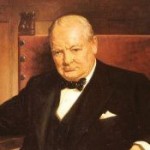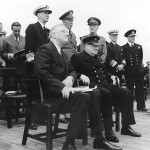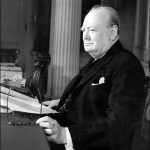strategist
 It’s always fun to find out that you are related to someone who is famous, and for me, it has been common knowledge for all of my life. The Spencer side of my family is full of aristocracy. Some are princes and princesses, and even future kings, and others were great strategists, like Winston Leonard Spencer-Churchill, who is my 15th cousin once removed. You will notice the hyphen, and while it isn’t in his name, it is nevertheless, correct. He was a product of grandparents who merged two wealthy family names, when his 4th great grandfather, Charles Spencer married Ann Churchill and they hyphenated the names. Later, family members either used the traditional Spencer name, such as Diana Spencer’s line, or they used the Churchill name, as Winston Churchill’s line did, even though they continued the Spencer part of the name in his line. People have often thought it was his middle name, but that is not so. I don’t know if they used the hyphen back then, but the names were both last names.
It’s always fun to find out that you are related to someone who is famous, and for me, it has been common knowledge for all of my life. The Spencer side of my family is full of aristocracy. Some are princes and princesses, and even future kings, and others were great strategists, like Winston Leonard Spencer-Churchill, who is my 15th cousin once removed. You will notice the hyphen, and while it isn’t in his name, it is nevertheless, correct. He was a product of grandparents who merged two wealthy family names, when his 4th great grandfather, Charles Spencer married Ann Churchill and they hyphenated the names. Later, family members either used the traditional Spencer name, such as Diana Spencer’s line, or they used the Churchill name, as Winston Churchill’s line did, even though they continued the Spencer part of the name in his line. People have often thought it was his middle name, but that is not so. I don’t know if they used the hyphen back then, but the names were both last names.
Churchill was born to Lord Randolph Spencer and his wife Jennie Jerome, on November 30, 1874. They were members of a prestigious family with a long history of military service and upon his father’s death in 1895,  Winston joined the British Fourth Hussars. During the next five years, Winston Churchill enjoyed an illustrious military career, serving in India, the Sudan, and South Africa, and distinguishing himself several times in battle. In 1899, he resigned his commission to concentrate on his literary and political career and in 1900 was elected to Parliament as a Conservative MP from Oldham. In 1904, he began serving in a number of important posts before being appointed Britain’s First Lord of the Admiralty in 1911. Churchill foresaw a war that would bring with it a need for a navy that was ready, and well thought out strategies that would bring victory, and he worked to bring such a British Navy into existence. Churchill was a born strategist.
Winston joined the British Fourth Hussars. During the next five years, Winston Churchill enjoyed an illustrious military career, serving in India, the Sudan, and South Africa, and distinguishing himself several times in battle. In 1899, he resigned his commission to concentrate on his literary and political career and in 1900 was elected to Parliament as a Conservative MP from Oldham. In 1904, he began serving in a number of important posts before being appointed Britain’s First Lord of the Admiralty in 1911. Churchill foresaw a war that would bring with it a need for a navy that was ready, and well thought out strategies that would bring victory, and he worked to bring such a British Navy into existence. Churchill was a born strategist.
Winston Churchill’s military leadership took quite a blow during World War I, when he was held responsible for the disastrous Dardanelles and Gallipoli campaigns in 1915, and he was excluded from the war coalition government. He resigned his commission, and volunteered to command an infantry battalion in France. In 1917, Churchill returned to politics. He became a cabinet member of the Liberal government of Lloyd George, a move that I suspect he would regret. From 1919 to 1921, he was secretary of state for war. Then, in 1924 he returned to the Conservative Party, where two years later he played a leading role in the defeat of the General Strike of 1926. Out of office from 1929 to 1939, Churchill issued unheeded warnings of the threat of German  and Japanese attacks. After the outbreak of World War II in Europe, Churchill was called back to his post as First Lord of the Admiralty and eight months later replaced Neville Chamberlain, an ineffective military leader, as prime minister of a new coalition government. In the first year of his administration, Britain stood alone against Nazi Germany, but Churchill promised his country and the world that the British people would “never surrender.” He rallied the British people to a strong resistance and expertly orchestrated Franklin D Roosevelt and Joseph Stalin into an alliance that eventually crushed the Axis. Churchill proved himself to be the best military leader Britain could possibly have had at a time when he was desperately needed. Today would have been Winston Spencer Churchill’s 142nd birthday.
and Japanese attacks. After the outbreak of World War II in Europe, Churchill was called back to his post as First Lord of the Admiralty and eight months later replaced Neville Chamberlain, an ineffective military leader, as prime minister of a new coalition government. In the first year of his administration, Britain stood alone against Nazi Germany, but Churchill promised his country and the world that the British people would “never surrender.” He rallied the British people to a strong resistance and expertly orchestrated Franklin D Roosevelt and Joseph Stalin into an alliance that eventually crushed the Axis. Churchill proved himself to be the best military leader Britain could possibly have had at a time when he was desperately needed. Today would have been Winston Spencer Churchill’s 142nd birthday.

